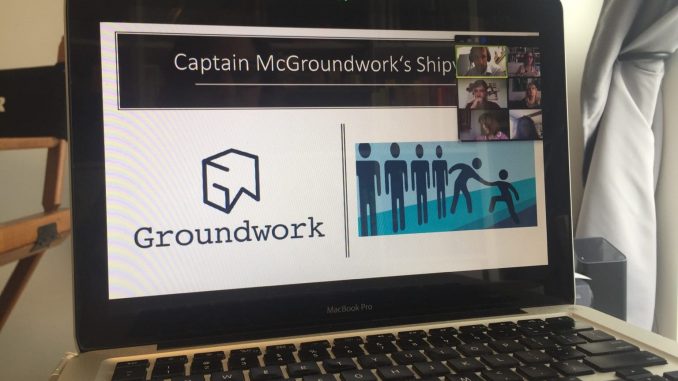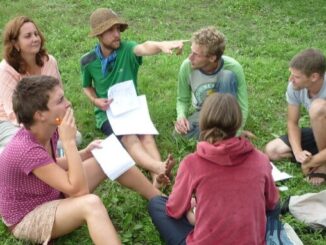
As we believe in the power of play, one of our approaches in order to develop teams is to set learning arenas built by our Serious Games. The last month’s “Lord McGroundwork’s Shipyard”, our new Business Learning Game addressing the topic of “onboarding”, was developing well and was ready to be tested. Due to the restrictions regarding physical contact, the Board Game could not be tested as planned. Emotionally this felt like a big downfall for us after riding on an emotional high developing the Game so far. Dealing with the unknown and challenges are recurring elements in our Business Learning Games, so we took the actual situation as learning arena and said: “Ok let us play test the idea ONLINE”. Easily said, yet the execution was not as simple.
This article shares our experiences and ideas for an effective transformation process from a classic board game setup to online use.
We are passionate facilitators and game designers but not technicians, hence we will focus on the thinking behind changing the environment setup. Our principles of creating a safe space, a playful experience providing the base for valuable reflections and focusing on direct and personal interactions, we wanted to transfer to the online version. We learned that assuring this was a bit trickier than anticipated.
The following key elements were important for an effective transformation:
- Letting loose of your own assumptions as facilitator. We had to deal with our own emotions prior to being ready to change it to an online play test, when we quickly realized that some ideas and tasks could not be converted easily. But reminding ourselves that as facilitators we are the only ones knowing the actual difference, helped us to let go of our own assumptions and dare to look upon this as potentially the start of something new.
- Be curious about the online world. When we started to be curious about what tools different communication platforms have to offer, new ideas started to develop. After finishing the “transformation”, the online version has some specific characteristics compared to the board game. We learned that in order to be successful in the online version, a certain communication structure has to be established as communication differs to communication in “real life”. For example: breaks in interpersonal communication are more or less normal, in online settings they are often associated with lack of clarity or technical problems. Or talking simultaneously is somehow doable in personal discussions and can be easily solved, while it is more difficult to solve it online. Therefore, we included the element of “establishing an internal structure of communication” as task, which the teams have to deal with prior entering “Lord McGroundwork’s Shipyard” and starting the actual game. We decided to give the responsibility to each team to structure their communication because, how they handled this experience can be used perfectly for reflection in case during and after the game. In our experience, even non-remote teams can get valuable output for everyday life by experiencing a new communication structure.
- Define the facilitator role. We included the instructions referring to the communication tools into the narrative given by the facilitator. While in our case the facilitator has the role of being a representative of Lord McGroundwork, he/she also informs the playing team on how to use the technical features (for example: shows them how they can draw or how they can set up surveys). In some tests we used two facilitators: one being responsible for giving the narrative and leading the reflections, while the other one being the technical instructor. This division worked very well for the players involved in the game and for us as well.
- Use the bonuses of online variants. Besides the fact that you can easily play with people all over the world at the same time without any extra hurdles, the following advantages refer to the structure of online setup itself:
- Two ways of communication: written chat and video/call function. This presents you with some further possibilities to conduct debrief, reflection and feedback methods. Additionally, as part of the game dynamics, we sent private messages with special instructions to individual players without the others noticing it. Thus surprises and challenges can be delivered in an even more subtle way.
- The personal choice of going on mute and/or switching on or off the camera: When facilitating a relaxation technique or an icebreaker far out of the personal comfort zone, this can help to feel comfortable. In normal settings, participants sometimes have difficulties because they feel “observed”. By having this personal choice, the online setting can quickly create a safer space. On the other hand, we observed also that when some team members are having their camera on and some off throughout the Game, this can have an impact on belonging and psychological safety in a team.
- Starting together: By experience, in normal settings usually team members arrive at varying times. Some are already present 30 minutes before, maybe try to sneak peek or try to get information through informal talks, while others arrive on point. By giving access to the online room at the same time, starting together can be easily ensured.
- Clarity: As you only have reduced information on the non-verbal communication level, in online setting an even higher standard of clarity is required. As facilitator you get immediate feedback when your instructions were not fully clear, but also the players easily learn how to be clear and concrete.
- Acknowledge the challenges. Varying technical knowledge and individually different equipment used (for example: one or two screens) lead to the challenge that as facilitator you have to have an eye on the distinction in the reflection on the technical part and the topic-related points (in our case: onboarding experience). Starting the after-game-reflection with a short debrief of how the game experience worked online gives you and the team an indication of the first part. This is essential in order to progress with topic-related reflection points.
Summing up, changing a board game into an online version can be challenging as non-technical expert, but is a very interesting experience as game designer and facilitator. When accepting that the new game is unique and not a simple copy of the board game, diving into the possibilities the online world has to offer can lead to many learnings. Our main take aways are that the idea of our board game version was successfully tested and such a transition can challenge you as facilitator resulting in valuable learnings for facilitations in general. We are happy how our Business Learning Game “Lord McGroundwork’s Shipyard” made progress and as the playtests were very successful, we now even consider making an online version of it as well.
- Changing a classic board game to online: A look behind the scenes - 20th June 2020





What about using Tabletopia as a platform?